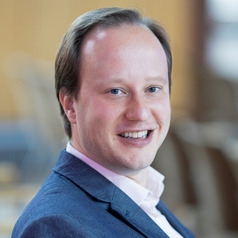
Niels C.M. Martens
Marie Curie Fellow, Utrecht University
Dr. Niels C.M. Martens is a philosopher of physics, astronomy & cosmology. Currently a Marie Curie PostDoc at Utrecht University, he will soon start as University Lecturer, with a 5-year ERC project on the tenability of the conceptual distinction between spacetime and matter in the context of astronomy and cosmology (e.g. dark matter, dark energy, black holes). His experience with the social epistemology of scientific collaborations stems from leading the Collaborations Focus Group of the History Philosophy Culture (HPC) Working Group of the Next Generation Event Horizon Telescope Collaboration (ngEHT), as well as being a former PostDoc in the Epistemology of the Large Hadron Collider Research Unit. Dr. Martens has published extensively on the interpretation of physical quantities and symmetries in physics.
Less ![]()
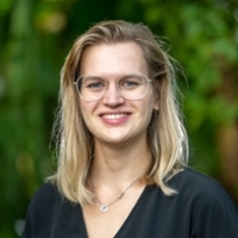
Nienke Beets
PhD Candidate, Botany and Science Communication, Leiden University
My main research subjects are urban flora and citizen science. I am working on a Dutch citizen science project where we map out where and what different pavement plants grow in cities and towns, together with citizens. Using the data about pavement plants, I am interested in researching the impact of anthropogenic (human) disturbance or maintenance practices on the species composition and distribution of pavement plants. Secondly, I study the projects citizen science participants, their motivations and the impact of the project on lessening plant blindness and enriching their (urban) nature experience.
Less ![]()
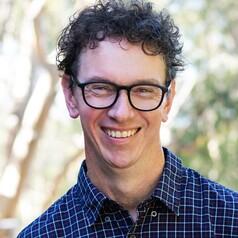
Nigel Andrew
Professor of Entomology, Southern Cross University
Nigel is a 2020 Fulbright Senior Scholar. His research investigates the responses of insects (native and introduced pests and natural enemies) to environmental extremes and rapid climatic changes. Nigel is currently a member of the ARC College of Experts Editor-in-Chief of Austral Ecology, Chair of the Holsworth Wildlife Research Endowment, and vice-President of the Entomological Society of NSW.
Less ![]()
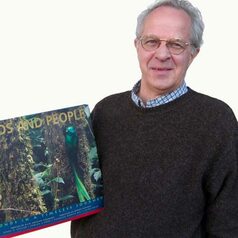
Nigel Collar
Honorary Professor of Biological Sciences, University of East Anglia
I am a Leventis Fellow in conservation biology with BirdLife International, where I have previously worked as the Director of Science, Director of Development, Chairman of the ICBP Bustard Group and the compiler of the International Bird Red Data Book. My current work involves studying threatened birds and habitats through fieldwork and the support of graduate students.
I am a Honorary Professor at the University of East Anglia’s School of Biological Sciences and have written over 100 scientific papers and 12 books including Birds and People: Bonds in a Timeless Journey and Facing Extinction: The World’s Rarest Birds and the Race to Save Them.
Less ![]()

Nigel Fletcher
Teaching Fellow in Politics and Contemporary History, King's College London
Dr Nigel Fletcher completed his PhD at King's on the history of the Official Opposition in the UK, and has taught on the Politics and Contemporary History MA since 2017. He took his first degree in Politics at Queen Mary, University of London, where he was awarded the Professor Lord Smith Prize for his undergraduate dissertation on the Conservative Party in Opposition. He then worked for over a decade as a political and policy adviser in the House of Commons, the London Assembly and the Conservative Research Department, where he was special adviser on education and skills. He also served many years as a Councillor in the Royal Borough of Greenwich, eventually becoming Leader of the Opposition.
The relative lack of research on political opposition prompted him to establish the Centre for Opposition Studies as an independent research organisation devoted to promoting the study of the subject. It has as its Honorary Presidents two former UK opposition leaders, Michael Howard and Neil Kinnock, and is now chaired by Baroness Royall, former Labour Leader in the House of Lords. In 2017 the Centre formed a new academic partnership with the University of Bolton, where it is now hosted. As well as public seminars and lectures, it has also run a programme of education and engagement in the Middle East with funding from the UK Foreign Office.
Dr Fletcher edited the book "How to be in Opposition" (Biteback, 2011), contributed a chapter to "Leaders of the Opposition from Churchill to Cameron" (Palgrave Macmillan, 2012), and his first monograph, based on his PhD thesis, is due for publication by Routledge. He contributes regularly in the media on the subjects of opposition, political history and the constitution, with appearances on the BBC, Times Radio and numerous overseas broadcasters. He also presents the “OppositionCast” podcast, produced by the Centre for Opposition Studies.
Research
Dr Fletcher's research interests include political opposition, UK political institutions and the constitution and British political history since 1945. He also has a special interest in the modern monarchy and its place in the constitution.
Less ![]()
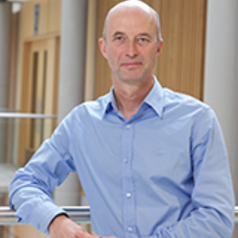
Nigel Hudson
Senior Lecturer in Law, Nottingham Trent University
Nigel Hudson is a Senior Lecturer at Nottingham Law School, and an active member of the research Centre for Legal Education. He started his legal career with five years as a solicitor at Edge & Ellison before joining Nottingham Law School as a Principal Lecturer in 1993. Since 2003 Nigel has worked for the University of Law as the Head of Learning Design, the University of Derby as the Online Learning Academic Lead in Law, and for CILEx as an Independent Adjudicator.
In December 2015 Nigel returned to Nottingham Law School to teach as a Senior Lecturer in Law. He is currently studying a Professional Doctorate in Legal Education at NTU, examining the Communities of Practice within the legal professions as his main area of research. He also covers Legal Informatics and Learning Technology as additional areas of research interest.
Less ![]()
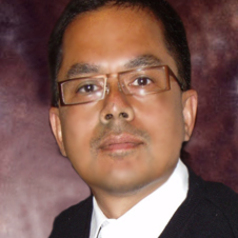
Nigel Martin
Lecturer, College of Business and Economics, Australian National University
Nigel Martin is a Senior Lecturer and researcher at the National Centre for Information Systems Research (NCISR) at the Australian National University (ANU), and specialises in the theory and practice of technology strategy, e-security, enterprise systems architecture, and operational business management.
Less ![]()
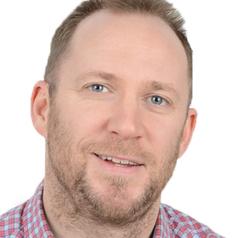
Nigel Mulligan
Assistant Professor in Psychotherapy, School of Nursing, Psychotherapy and Community Health, Dublin City University
Dr. Nigel Mulligan is an assistant professor in Dublin City University and teaches psychoanalysis in the School of Psychology at Dublin City University (DCU). He fully accredited psychoanalytically informed psychotherapist, addiction counsellor, group therapist and couples counsellor. He works with individuals and couples who experience depression, anxiety, anger, grief, PTSD, paranoia, addictions, sexual dysfunction and symptoms of psychosis. Nigel has internationally published articles on psychotherapy, depression, anti-depressant medication and inter-generational trauma.
He is a registered practitioner of psychotherapy (IAHIP) and is Research affiliate of APPI.
His practice is underpinned by the ethics and philosophy of integrative and humanistic psychotherapy (IAHIP) and is accredited psychotherapist with the Irish Council for Psychotherapy (ICP) and a Registered member of Addiction Counselors of Ireland (ACI) and abide by their code of ethics.
Less ![]()
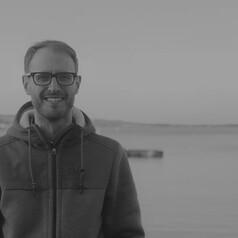
Nigel Sainsbury
Research Associate / Project Director, Earth to Ocean Research Group, Simon Fraser University
I have a PhD in Geography and Environmental Social Science from University of Exeter (2021), a MSc in Conservation Science from the University of Exeter (2016), and a BSc in Management Science from the University of Warwick.
Less ![]()
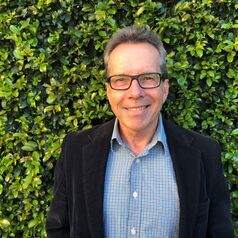
Nigel Spence
Research Fellow, School of Health and Society, University of Wollongong
Nigel Spence is a Research Fellow at the University of Wollongong, a casual academic at the University of New South Wales and Study Manager for the SAHAR project that is investigating culturally sensitive DV screening and response strategies in refugee settlement services.
He has a long career in child welfare and international development. Between 2006 and 2019, Nigel was the CEO of international development agency ChildFund Australia, and previously was CEO of the NSW Association of Children's Welfare Agencies (ACWA) having spent many years in his early career as a social worker working with children in out of home care.
Less ![]()
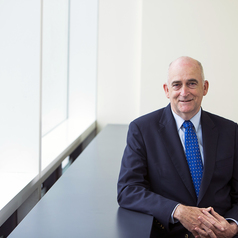
Nigel Stapledon
Andrew Roberts Fellow and Director Real Estate Research and Teaching Centre for Applied Economic Research, UNSW Australia
Nigel has a PhD in Economics from UNSW and a Bachelor of Economics with Honours from the University of Adelaide. He started his career in Canberra 1976-86, where he worked in the Commonwealth Treasury. He then worked at the Westpac Banking Corporation 1986-2003 where he was Chief Economist from 1993. Nigel has been at UNSW Business School since 2003 where he completed a PhD on the long-run history of house prices in Australia (1880-2006). At the UNSW Business School, he was Associate Head of School 2008-13 and is now the Andrew Roberts Fellow in Real Estate in the Centre for Applied Economic Research (CAER). He established and now coordinates the real estate teaching program at the Business School and teaches the Real Estate Economics and Public Policy course for both undergraduate and postgraduate students. Nigel is a regular commentator in the media on macro-economics and housing.
Less ![]()
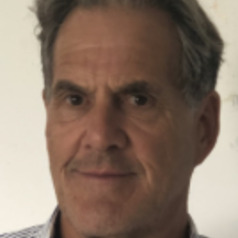
Nigel Strauss
Psychiatrist and Clinical Associate at The Centre of Mental Health, Swinburne University of Technology
Dr. Strauss is a clinical and research psychiatrist with a special interest in Psychedelic Assisted Psychotherapy. He is a MAPS trained therapist and currently an Investigator in 5 PAT trials in Melbourne. He is also currently a psychedelic psychotherapist using psilocybin in 2 of these trials. He is also an Honorary Senior Consultant at St Vincent’s Hospital Melbourne.
Less ![]()
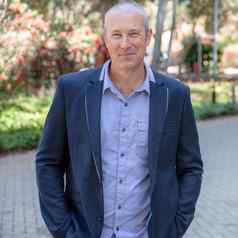
Nik Callow
Associate Professor - Geography, The University of Western Australia
I am a Geographer, working across the areas of hydrology, geomorphology, Geographical Information Science (GIS), and remote sensing. My work is focused on advancing physical geography and our understanding of Australian landscape processes, particularly the impacts from changes in climate and human interaction with landscapes.
I established and manage the Civil Aviation Safety Authority (CASA) licenced drone remote sensing group as Chief Remote Pilot for The University of Western Australia (CASA.ReOC.0628) and hold the institutional Remote Operators Certificate (ReOC). I manage and oversee the Remotely Piloted Aerial Sensing Platform and drone operations across UWA.
Less ![]()
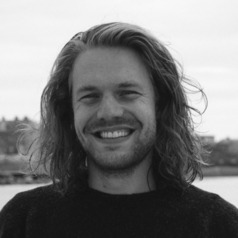
Nik Dennler
PhD Graduate in Computer Science, Western Sydney University
Nik Dennler recently graduated with a Ph. D. in Computer Science, from the University of Hertfordshire and the International Centre of Neuromorphic Systems at Western Sydney University.
His research involves the exploration and development of novel sensor platforms and the design of suitable algorithms, leading to improvements in the current state-of-the-art of rapid olfactory sensing. Further interests include efficient sensory coding, neuromorphic computing, and applications thereof.
He got his B. Sc. in Physics from the University of Zurich (2018) and his M. Sc. in Neural Systems and Computation, from ETH Zurich and University of Zurich (2021). Further, he worked in various industrial research labs, such as Sensirion AG, IBM Research—Zurich, and Sony Electronics.
Less ![]()
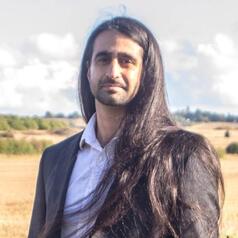
Nikhil Datta
Assistant Professor, Economics, University of Warwick
I am an applied micro economist with an interest in labour and urban economics. My research spans topics including labour market power (such as monopsony) and its sources, minimum wages, atypical work arrangements (such as zero-hours contracts and the gig economy) and the housing market. I have also done extensive policy work on Brexit. In my research I use quasi-experimental methods and large micro datasets alongside theory to try to answer policy relevant questions.
Less ![]()
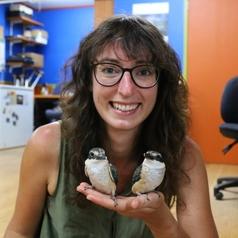
Niki Teunissen
Postdoctoral researcher, Wageningen University
I am a behavioural ecologist, often combining intense field work with detailed observations on marked animals. I got my BSc and MSc degree from the University of Groningen, the Netherlands. For my MSc, I travelled to the Seychelles to study interspecific competition between birds, and to the Kimberley (Western Australia) to study benefits of group living in endangered purple-crowned fairy-wrens. I have continued working with the purple-crowned fairy-wrens ever since. For my PhD at Monash University, my research focused on the benefits of cooperation and living in social groups and explains why subordinate fairy-wrens help raise others’ offspring and defend against predators. I continued as postdoctoral research fellow at Monash University, conducting research with a conservation focus, investigating environmental impacts on breeding success and survival. My current research at Wageningen University (the Netherlands), focuses on understanding why many animals stay at home to live in social groups instead of dispersing to breed independently elsewhere.
Less ![]()
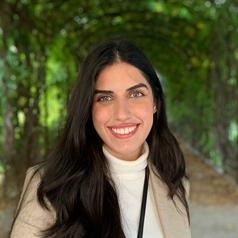
Nikita Kalwani
M.A. Student in School and Applied Child Psychology, Western University
Nikita Kalwani is an M.A. student in the School and Applied Child Psychology program at Western University. Nikita graduated from McMaster University with an Honours science degree in Psychology, Neuroscience, and Behaviour, with a specialization in Mental Health. She has an interest in research that informs school- and community-based interventions that support the mental health outcomes of marginalized youth who may experience systemic barriers to accessing care.
Less ![]()
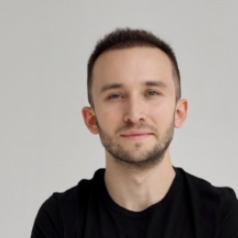
Nikita Savin
PhD Candidate in Political Science, University of California, Los Angeles
Nikita Savin studies misinformation, media effects, media bias, political violence, text analysis. He received his education at the Higher School of Economics (Moscow), BA and MA in Political Science. His research interests are comparative politics, American politics.
Less ![]()
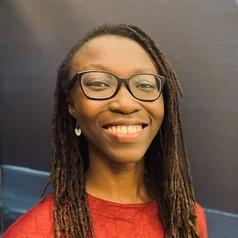
Nikitta Dede Adjirakor
Postdoctoral research fellow, University of Ghana
Dr Nikitta Dede Adjirakor is an academic researcher and creative writer. She holds a Feodor Lynen Fellowship with the Alexander von Humboldt Foundation and is a post-doctoral fellow at the University of Ghana. Her research focuses on literature in African languages, particularly poetry, aesthetics, popular culture and digital literature. Her creative writing focuses on the intersections between belonging, language, health and trauma. Nikitta is the writer and producer of the award-winning documentary 'A Thousand Needles' which explores African women’s health. She is the author of the forthcoming poetry chapbook 'Learning to Say My Name' (2023) to be published by the African Poetry Book Fund. Her children’s book Dede Dances at Our Day has been published in English and Twi. Under Write Ghana Literary Initiatives, she co-edited the Ga poetry anthology 'Hɔmɔwɔ: Ga Lalawiemɔi' and co-produces multilingual literary projects in Ghanaian languages.
Less ![]()
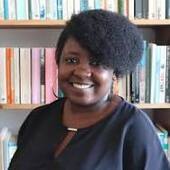

Nikki Crowley
Assistant Professor of Biology, Biomedical Engineering and Pharmacology, Penn State
Dr. Crowley is the Director of the Penn State Neuroscience Institute at University Park, the Huck Early Career Chair in Neurobiology & Neural Engineering and an Assistant Professor of Biology, Biomedical Engineering, and Pharmacology at Penn State. Crowley’s research centers around understanding neuropeptides as unique signaling molecules in the brain, with an emphasis on the interactions between neuropeptides and neurotransmitters. Crowley is the recipient of the American College of Neuropsychopharmacology’s Editors Early Career Award (2022), a Young Investigator Award from the National Institute on Alcohol Abuse and Alcoholism and National Institutes of Health (2023), and The Whitaker Center’s Women of Impact: Woman to Watch Award (2023). Dr. Crowley joined the Department of Biology as an assistant professor in 2020. She is a Washington, DC native, forever east-coaster, and second-generation Penn Stater.
Less ![]()
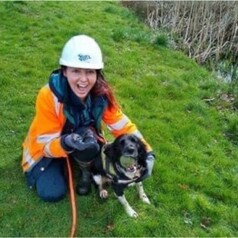
Nikki Glover
PhD Candidate in Environmental Biology, University of Salford
I am a PhD student at the University of Salford studying how factors can influence the detection of great crested newts, a legally protected amphibian species located in the UK. I have been a dog handler since 2017 and have received rigorous training and assessments through Louise Wilson of Conservation K9 Consultancy, a leading wildlife detection dog trainer. As wildlife detection dogs are relatively new method within the UK, my academic findings will hopefully highlight their effectiveness as well as how environmental factors may influence their detectability which will help shape future training and search methodology.
My research has also provided insight into the terrestrial habitat preferences of great crested newts both above and below ground. The dogs provide a novel non-invasive method and the findings will hopefully guide future habitat management practices.
In addition to my research, I am also a Senior Ecologist at Wessex Water. I have deployed the dogs operationally to help locate and move the newts safely before essential pipeline installation works commence. The use of dogs has saved countless numbers of newts as well as saving the company time and money and the reduction in use of plastic waste from pitfall traps. I am a board member of the Advisors for the use of Detection Dogs for Conservation (ADDC). As director of Amphibian and Reptile Detection Dogs I offer consultation and shadowing opportunities for those wanting to become great crested newt detection dog handlers.
Less ![]()
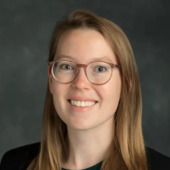

Nikki Shure
Associate Professor in Economics, UCL
Nikki Shure is Associate Professor in Economics at the UCL Social Research Institute at University College London and a Research Fellow at the Institute of Labor Economics (IZA). She completed her PhD in Economics as a Weidenfeld Scholar at the University of Oxford with a focus on labour economics and education economics. Her research interests include non-cognitive skills and educational outcomes, gender and ambition, international comparisons of education systems, and inequalities in access to higher education and the labour market. Nikki’s research has been funded by the ESRC, British Academy, and Nuffield Foundation and featured in The Guardian, The Washington Post, Time Magazine, and The Economist.
Less ![]()
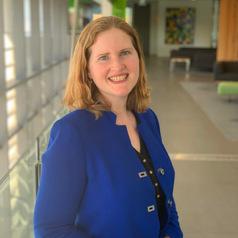
Nikki-Anne Wilson
Postdoctoral Research Fellow, Neuroscience Research Australia (NeuRA), UNSW Sydney
As a member of the UNSW Ageing Futures Institute, Nikki-Anne's current research explores dementia risk reduction as well as novel interventions to support older adults with cognitive decline.
Less ![]()
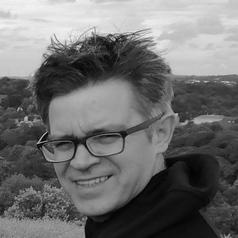
Niklas Ihssen
Associate professor, Durham University
Niklas Ihssen is an Associate Professor at the Department of Psychology, Durham University. He has a PhD in Psychology from the University of Konstanz, Germany. As an affective neuroscientist and experimental psychologist he has published in the areas of human reward, motivation and addiction. His recent work looks at the rewarding nature of social media and their addictive potential.
Less ![]()

Nikolajs Zeps
Professor, School of Public Health and Preventive Medicine, Monash University
Less ![]()
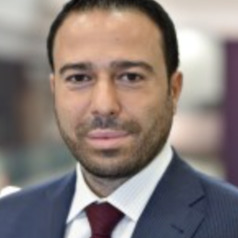
Nikolaos Papanikolaou
Senior Lecturer in Finance, Newcastle University
My research interests are as follows:
Banking: risk management, regulation & supervision, market structure & competition, efficiency & productivity analysis.
Financial accounting: transparency, disclosure, data manipulation, fraud.
Finance: financial engineering, securitisation, financial derivatives, off-balance-sheet leverage, hedging, speculation, Fintech, alternative finance, innovation.
Financial stability: systemic risk, procyclicality, liquidity, contagion, compliance.
Monetary economics: monetary policy transmission, quantitative easing, interest rates and economic growth, bank stress tests.
Corporate finance: earnings management, corporate governance, corporate culture, reputational risk.
I have conducted a number of research projects individually and in collaboration with scholars from UK Universities and also from abroad, and have developed a broad research network. My research has been published in a number of highly-ranked (ABS 3*) academic journals (Journal of Banking and Finance; Journal of Financial Stability; Journal of Financial Services Research; Financial Markets, Institutions & Instruments; Business Strategy and the Environment; Economics Letters; European Journal of Finance, etc.). I have presented my studies in numerous international conferences and other high-impact events. In this context, I have received several awards and distinctions for my research.
I have worked at the Business School of Bournemouth University as a Senior Lecturer (Research) in Accounting and Finance. Before joining BU, I was working as Assistant Professor in Banking and Finance at the University of Sussex. Furthermore, I hold the position of Adjunct Associate Professor at the University of Luxembourg and also various academic positions at the University of Glasgow, University of Bath, and University of Essex. In the recent past, I have held visiting academic positions at Stern School of Business at New York University, the Department of Economics at the University of Illinois, and the Department of Banking and Finance at Chulalongkorn University in Thailand.
Less ![]()
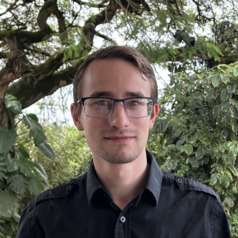
Nikolay Malkin
Chancellor's Fellow (AI and Datascience), School of Informatics, University of Edinburgh
Website: https://malkin1729.github.io/
Excerpt:
I work on algorithms for deep-learning-based reasoning and their applications. I am specifically interested in the following subjects.
- Machine learning for generative models, in particular, induction of compositional structure in generative models and modeling of posteriors over high-dimensional explanatory variables (including with continuous-time (diffusion) generative models). Much of my recent work is on generative flow networks, which are a path towards inference machines that build structured, uncertainty-aware explanations for observed data.
- Applications to natural language processing and reasoning in language: what large language models can do, what they cannot do, and how to overcome their limitations with improved inference procedures. I view human-like symbolic, formal, and mathematical reasoning via Bayesian neurosymbolic methods as a long-term aspiration for artificial intelligence.
- Applications to computer vision: notably, below you can find my work on AI for remote sensing (land cover mapping and change detection), which can be used for tracking land use patterns over time and monitoring the effects of climate change.
Less ![]()
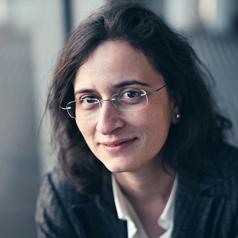
Nil Özçaglar-Toulouse
Professeure des universités, LUMEN (ULR 4999), Université de Lille
Nil Özçaglar-Toulouse est professeure des universités à l'Université de Lille (Lumen, ULR 4999).
Ses recherches portent sur la transformative consumer research (bien-être), la culture de consommation (résistance des consommateurs, consommation éthique, acculturation du consommateur, projets identitaires) et le marketing social et ses incidences sur les politiques publiques).
Elle a été rédactrice en chef de la revue « Recherche et applications en marketing » (2014-2018), et siège actuellement au comité scientifique de recherche et applications en marketing, ainsi qu'au comité de rédaction du Journal of Marketing Management, Qualitative Market Research et Journal of Marketing in Brazil.
Elle est par ailleurs active au sein de l’Association française du marketing, de l’Association for Consumer Research et du Consortium of Consumer Culture Theory.
Less ![]()
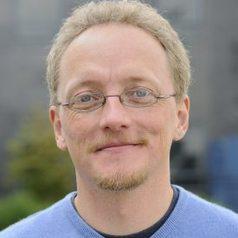
Nils Markusson
Lecturer in Environmental Politics, Lancaster University
The core of my interest is about the politics of environmental technology. I want to understand the relationship between how we develop and use technology in response to environmental problems on one hand, and political processes at varying scales in society on the other.
I am a social scientist, with a background in engineering, innovation policy, innovation studies and science & technology studies (STS), and most recently cultural political economy. Much of my work is done in multi- and interdisciplinary collaborations, spanning social science, natural science, engineering and the humanities. I am a qualitative researcher, and favoured data sources include documents and interviews.
Less ![]()
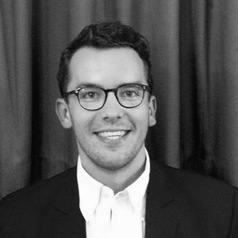
Nils Röper
I'm a doctoral researcher focusing on the political economy of pension and financial systems.
Less ![]()
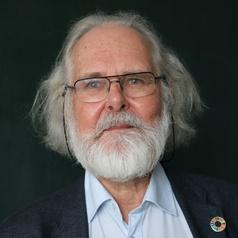
Nils Christian Stenseth
Professor and Chair, Centre for Ecological and Evolutionary Synthesis (CEES), University of Oslo
Research interests:
Population biology (ecology and genetic structuring); large-scale ecological and evolutionary patterns; effects (ecology and evolution) of climate variation; terrestrial, marine and freshwater systems.
I am a Core Member, Research Professor and the Chair of CEES. In addition, I am a Chief Scientist at the Institute of Marine Research.
My research interests span a broad spectrum of ecological and evolutionary topics, most of which are rooted in population biology. Before the early 1990s, much of my work was purely theoretical. Later, I have adopted the research strategy of 'asking' available data what the underlying ecological or evolutionary process might most likely be - all within a theoretical perspective. I strongly favour comparative studies - by comparing similar features between different (but comparable) systems, we typically learn more than we otherwise would have done. Variations in population densities in time and space - and the underlying demographic processes - have been a main interest of mine over the years. An important example is the interdependent relation between density-dependent and density-independent processes, where the ecological effect of climate is an important example of the latter.
Most of my work relates to basic issues. (I have never claimed that my research is of any immediate use, although I do hope it will be in the long run.) However, I find great pleasure in working on more applied issues as well; I have never been ashamed of my research being of practical use here and now. These applied interests have brought me into work on pest control (e.g., rodents in Africa), harvesting (marine and terrestrial), bio-economics (e.g., the ecological dynamics of dry-land pastoral systems) and epidemiology (Plague).
I am convinced that it is helpful to try to understand what has happened in the past, in preparing for what might happen in the future, e.g., ecological and evolutionary effects of climate change. For this reason, I value the existence of long-term time series - and the analysis of them.
I love interacting with colleagues, and find great pleasure in building and maintaining teams. I am an ISI highly cited researcher.
Besides being an active scientist I am also a public advocate for science, actively participating in the discussions of how best to structure and strenghten the scientific community. I am an elected member of The Norwegian Academy of Science and the Letters, DNVA; I was the vice-president/president of that Academy 2009-2014. I am also an elected member/fellow of several other academies, including the Royal Norwegian Society of Science and Letters, DKNVS, Academia Europaea, French Académie des Sciences and the Finnish Society of Sciences and Letters. I have been awarded honorary doctorates (Doctor Honoris Causa) at the University of Antwerpen, Belgium (2001) and at the École Normale Supéreure, Lyon, France (2011), and I am honorary Professor at Addis Ababa University in Ethiopia. I am Chevalier (Knight) in the French National Order of the Legion of Honour.
I am the president of the International Biological Union (IUBS) as well as member of the Scientific Council of the European Research Council (ERC). I also do quite a bit of editorial work, including as Editor-in-Chief of Climate Research.
Less ![]()
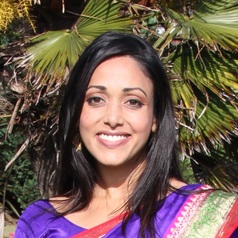
Nilufar Ahmed
Background: I have a degree in Psychology, an MSc in Applied Psychology and PhD in Human Geography. I am a Chartered Psychologist and also work as an Intersectional Psychotherapist in private practice. I have worked in community organisations and held various research and teaching positions in universities across England and Wales. I hold positions at a number of charities across the UK.
My research interests are areas of expertise: human behaviour, mental health, inequalities, equality and inclusion, ageing, ethnicity, religion (esp Muslims in the UK), gender and place, racism and representation in Higher Education
My particular interest is in the dynamic interaction of people and place, how people transform the spaces the inhabit, and in turn and changed by those spaces.
My current research focuses on developing trauma informed care and decolonisation of the curriculum.
Less ![]()
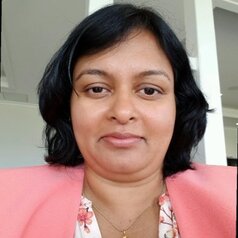
- Market Data





















